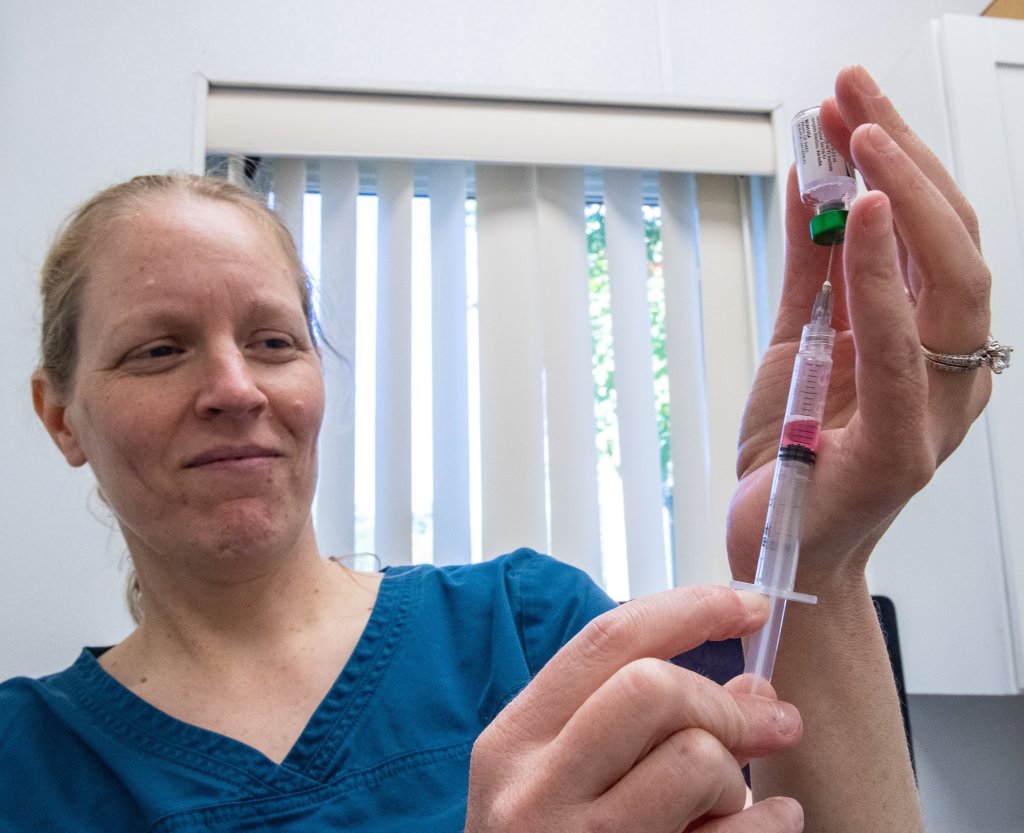
What should I do if I hear about parvovirus cases near me?
Parvovirus is a highly contagious, often deadly virus that has been reported among dogs in Androscoggin, Penobscot and Oxford counties, plus other communities across Maine. If you hear of cases in your area, avoid taking your dog to a dog park or other public places where pets gather. The best protection against parvovirus is to get your dog vaccinated.
Is the rabies vaccine required for Maine’s pets?
Yes. Dogs and cats that are 3 months or older are required by Maine law to be vaccinated against rabies, but state officials strongly recommend the vaccine for other animals such as ferrets, horses and livestock. Rabies is almost always fatal and is carried by common wildlife animals in Maine, including raccoons, skunks, bats and foxes.
“That’s the no-brainer,” David Cloutier, board president of the Maine Veterinary Medical Association, said of the rabies vaccine. “Just do it. They are incredibly effective and we see almost no reaction.”
What vaccines are recommended for dogs?
Core vaccines are recommended for all dogs, regardless of lifestyle. They include vaccines for rabies, leptospirosis and a combination vaccine for several contagious and potentially deadly viral infections, according to American Animal Hospital Association guidelines.
The combination distemper vaccine, known as a DAPP or DHPP vaccine, is a three-dose shot recommended 6-8 weeks after birth that protects against canine distemper virus, two types of adenovirus, parvovirus and parainfluenza. The vaccine for leptospirosis can be included in the combination distemper or administered separately.
In Maine, tick-related vaccines are considered core by most experts, Cloutier said. “If you live in a place like Maine with a lot of ticks, it makes sense,” he said.
For cats?
Cats are recommended to get the rabies vaccine at around 4 months. While vaccine types and schedules differ, cats are recommended to get core vaccines that protect against feline leukemia, panleukopenia, herpes virus and calicivirus.
How often should my pet get a booster?
Dogs and cats should both get a rabies booster one year after their first dose, then every three years after that. The canine distemper vaccine follows the same schedule.
Are vaccines bad for my pet?
No. Vaccines have been proven to be a safe and effective way to prevent life-threatening diseases in animals. Some pets may experience mild, temporary side effects, but experts say the benefits of vaccinating against dangerous illnesses far outweigh any risks.
Can viruses or diseases be transmitted between humans and pets?
Yes. Rabies can be transmitted from animals to humans through bites or scratches. Leptospirosis, which can cause kidney damage, liver failure and death in humans, is spread through contact with the urine of infected animals, usually found in contaminated water or soil.
What if I can’t pay for a vaccine or veterinary care?
Many shelters and humane societies in Maine hold vaccination clinics at a low cost, including Bangor Humane Shelter, Greater Androscoggin Humane Society in Lewiston and Midcoast Humane in Brunswick. There are also vaccination clinics at several Petco and Tractor Supply Co. stores across Maine.
Clinics are a low-cost, easily accessible way to get vaccines, Cloutier said. You don’t even need a relationship with a veterinarian.
“We’ll vaccinate them right on the bed of the truck, no questions asked, $10 a piece,” he said.
Vaccination is the most cost-effective way to keep veterinary costs low. The canine distemper combination vaccine costs between $20 and $100, while experts say treatment for parvovirus can cost thousands.
Potential pet owners should consider whether they can afford vaccination and veterinary care before adopting a pet.

We invite you to add your comments. We encourage a thoughtful exchange of ideas and information on this website. By joining the conversation, you are agreeing to our commenting policy and terms of use. More information is found on our FAQs. You can modify your screen name here.
Comments are managed by our staff during regular business hours Monday through Friday as well as limited hours on Saturday and Sunday. Comments held for moderation outside of those hours may take longer to approve.
Join the Conversation
Please sign into your CentralMaine.com account to participate in conversations below. If you do not have an account, you can register or subscribe. Questions? Please see our FAQs.